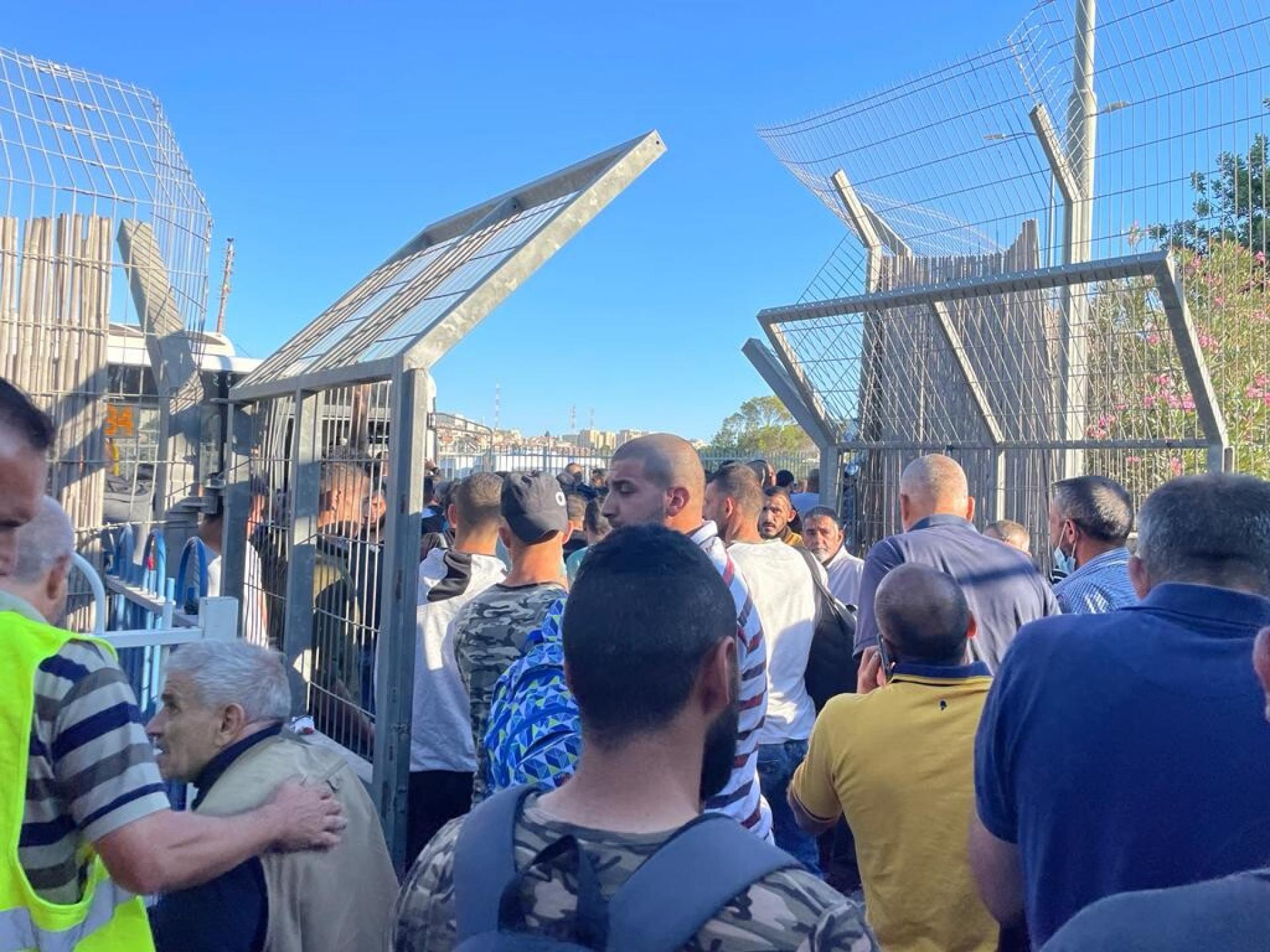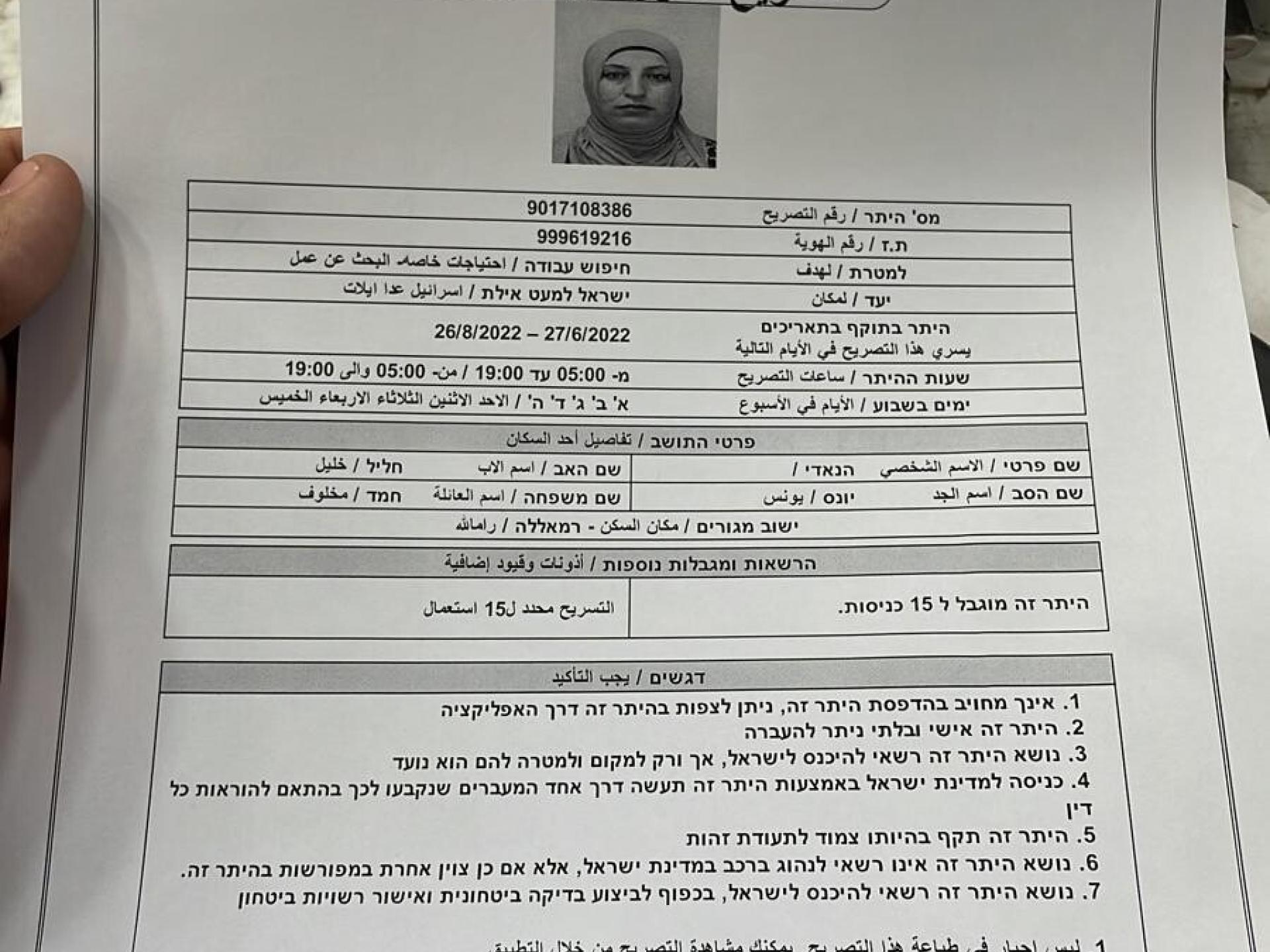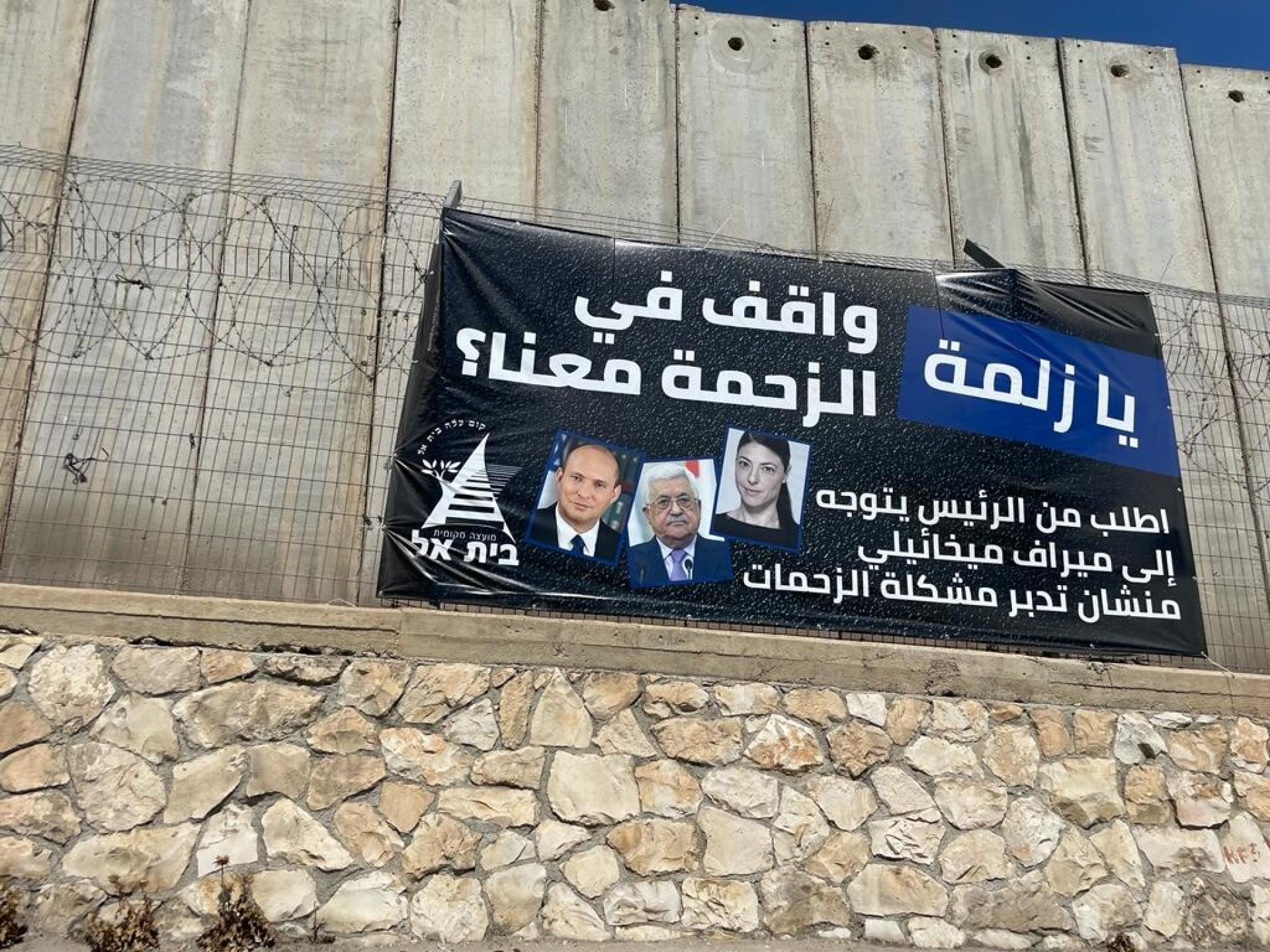Bethlehem CP - violence of policemen against MachsomWatch members
Bethlehem Checkpoint, Silwan, Olive Checkpoint, Qalandiya
7:15 Bethlehem Checkpoint (300)
As we approached the checkpoint, we saw long lines of workers marching towards Gilo Junction - the number of people was much larger than usual at this time. At the exit to Israel from the checkpoint, there was an enormous density and urgency for buses (see photo). When we asked what happened, we were told that the checkpoint opened late. We really had to work our way up to come and watch the Israeli side of the electronic scanner positions - permits and eyes, which finally allow the Palestinians to enter Israel.
As we stepped on the threshold of the checkpoint, we were attacked by two enormous armed policemen, with murder in their eyes. They tried to pushed Natanya and me outside with their bodies and guns at their chests screaming the Hebrew equivalent of "fuck off ". We have never encountered such brutality. We were pushed back violently while resisting and declaring that we are allowed to be on this side of the checkpoint, and we have been here for 20 years. We asked them to call the checkpoint commander or the DCO representative but we were ignored . They demanded our IDs. I gave mine, Natanya refused. We counted 5 soldiers and one female soldier who joined the riot, He, who said that he is the commander of the checkpoint, screamed that there was an incident inside. We asked how it was possible, then, that so many soldiers were actually here, to block two older women, one with crutches ...
Meanwhile, Natanya caught up with Hannah Barag who complained for us. Then P., the real checkpoint commander, took her place, took the hysterical policemen aside, explained, scolded, and calmed the riot, apologized to us and said that today is a mess because today is the first day (July 3) that you can use the improved job search permits that came into effect on July 1, but do not allow entry on Friday-Saturday (see photo), and thousands arrived on Sunday at once, and even though they opened in addition the humanitarian queue for everyone, everything collapsed. It turns out there was no event. We only saw some people being questioned who came in earlier than they were allowed to. We asked if the checkpoint opened late, and she denied this, but she and a senior police chief who also came apologized and explained that everything is concerned about our security in the checkpoint area. She admitted that there is a serious problem with the checkpoint structure, where there are only two Palestinian side turnstiles. Finally, the younger policeman approached us and apologized, saying that this is how he had been trained . We entered from the exit, he said, and that he knew nothing about us, and acted in accordance with training procedures. Natanya later told me that she did not know him when he approached us, he looked so different from his first horror show with which he had greeted us.
On the way out we spoke to an older electrician and plumber, one of the veteran workers amongst the faces which fill the checkpoints. He explained that some desperate seekers after work remain standing at the entrance to the checkpoint because sometimes there are employed workers who can introduce you to the contractor in the workplace. Standing next to him was a somewhat lost lovely woman from Bethlehem, Maysoon, who had come to look for a job of cleaning and cooking. We took details and decided to publish. Maybe you can help.
It is clear to us that the overcrowding at the checkpoints is exacerbated. The breaks in the fence which have been fixed has made it imperative to increase the number of work permits and entrance permits for others to search for work and all these pass through the checkpoint. It is clear to us that the soldiers are afraid of an attack. And it is also clear to us that if we were Palestinians, we would have ended our shift on the floor, bruised and probably also in detention.
We drove to Silwan via the South American Road and Sheikh Sa'ed - we came to see what was happening as we could not find out what the Supreme Court judges had ruled on Thursday regarding the Sumarin family's petition not to expropriate their home in Silwan, as required by the JNF.
We entered Baten al Hawa where more than 100 houses are candidates for demolition. The streets are empty, only settler shuttles roam the roads, from which narrow alleys and many houses that are prone to demolition branch off. Only a barbershop next to the settler houses on the slope of the City of David, near the entrance to the Gihon tunnel, is open. An older man received us with suspicion, and only after many clarifications and the entry of Kamal the driver, did he have confidence that we were who we said we were and offered us coffee and a link to the lawyer who handles the matter. It turns out that the court (in the welcome presence of Judge Dafna Barak-Erez) ordered the state to address the question of the legality of the declaration of the Sumarin family home as an absent property within 45 days. The lawyer reassures us that until President Biden leaves here, there will be no demolition. That's how it is, everything is political. By the way, the house of the Sumarin family is near the Garbage Gate, and below is probably planned the "mikvehs" tunnel that will reach from the City of David to the Ophel compound, just below El Aqsa. And this is already destructive messianic politics ... We said goodbye as friends to the lawyer, the barber and the client (or passerby) who had also received a demolition order. We were promised a special tour of the neighborhood.
It was already late, but we were going to visit the Olive Checkpoint anyway - there are not many passers-by at the checkpoint, but we are informed that a great mass of people had passed in the morning due to the late opening of Qalandiya. Connected vessels which are far apart. Every morning is a menacing and unknown adventure - and suddenly, you have to travel many miles to get to work or find a job. What is the impact of this constant uncertainty on the physical and mental health of the Palestinian people is a topic worthy of research.
We returned to Qalandiya to check out how to get on the bridge where we plan to shoot a short video …a continuation of some of the latest videos in the fascinating Machsom Watch series (not yet on Netflix). On the way we checked to see that they had not removed checkpoints and destroyed locations. The queues of cars on the way to the Hizma checkpoint were vicious l (we filmed an ad for the settlers asking the Palestinians to ask Mahmoud Abbas to ask Merav Michaeli to take care of the traffic problems in the area, ha ha ha...). The Jaba’ checkpoint, which was reported to have been activated and had traffic jams about a week ago, was wide open. On the Palestinian side of Qalandiya, the road from Ramallah to the vehicles checkpoint to Israel was very congested (good for a movie), and it seems that the unlikely situation that the buses dropping the Palestinians who have to cross the checkpoint on foot can drop them only far from the buses. And to make their long and weary way around a parking lot which is not entirely clear who owns it. We are probably ready to see difficult photos that will not shock anyone ...



